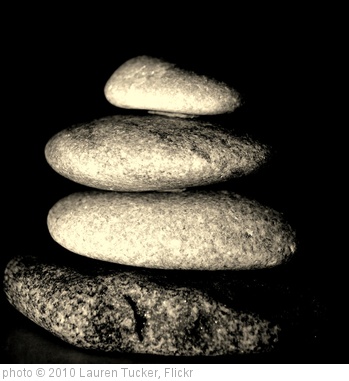 In the American justice system, all defendants are innocent until proven guilty beyond a reasonable shadow of doubt. Defense attorneys do not have to prove their client’s innocence; they just have to find enough holes in the prosecution’s argument to establish that they have not been proven guilty. But in the debate over Biblical interpretation on homosexuality, the burden of proof falls entirely on the defendants to prove their innocence. What if my fellow Methodists who are anti-gay had to provide not only isolated proof-texts and speculative translations of obscure Greek words but a coherent Biblical ethical explanation of why chaste monogamous homosexual partnerships are “incompatible with Christian teaching”? I think that would be a much more just and legitimate burden of proof.
In the American justice system, all defendants are innocent until proven guilty beyond a reasonable shadow of doubt. Defense attorneys do not have to prove their client’s innocence; they just have to find enough holes in the prosecution’s argument to establish that they have not been proven guilty. But in the debate over Biblical interpretation on homosexuality, the burden of proof falls entirely on the defendants to prove their innocence. What if my fellow Methodists who are anti-gay had to provide not only isolated proof-texts and speculative translations of obscure Greek words but a coherent Biblical ethical explanation of why chaste monogamous homosexual partnerships are “incompatible with Christian teaching”? I think that would be a much more just and legitimate burden of proof.
Usually when Christians change their mind about homosexuality, it’s after spending time with gay Christians who are so obviously holy and spiritually mature that it becomes hard to maintain the belief that a chaste homosexual relationship has corrupted them, which all sin is supposed to do to people. I have shared the disorienting experience I had in 2002 when I worshiped in a LGBT Methodist church with people who, other than being gay, behaved exactly like conservative evangelical Christians in terms of their lifestyle, their zeal for holiness, and their love of the Bible.
One of the main arguments Paul makes in the course of the most popular anti-gay proof-text, Romans 1:18-32, is that sin always corrupts human nature and produces other sins. So when you encounter gay Christians who are plainly not “filled with every kind of wickedness, evil, covetousness, malice… envy, murder, strife, deceit, craftiness… [and who aren't] gossips, slanderers, God-haters, insolent, haughty, boastful, inventors of evil, rebellious toward parents,foolish, faithless, heartless, [and] ruthless” (v. 29-31), it seems very legitimate to ask whether the “shameless acts” Paul is talking about in verses 27-28 were sinful for a reason other than the genders involved (like promiscuity, adultery, recklessness, etc), even if Paul mentions their same-genderedness as evidence of the “unnaturalness” of what they are doing, which is a different matter.
If we dig into Romans 1 not for an issue-based proof-text, but for an underlying cause to the sin that is being described, then this sentence is a good summary: “They exchanged the truth about God for a lie and worshiped and served the creature rather than the Creator” (v. 25). Every time that we give our worship to something in God’s creation rather than God Himself, whether it be food, drugs, money, or sex, we will be corrupted as a result. That is the basic truth of idolatry. There are many other examples of how idolatry corrupts people that could be substituted for the examples Paul shares in this passage. And it seems like a fair question to ask whether same-genderedness as such makes sexual intimacy idolatrous, independent of whether or not Paul thinks it’s “unnatural,” which is different.
The fact that Paul has a 1st century Jewish view of what “natural” gender relations look like is not the same as a direct prohibition of homosexuality. Paul never directly prohibits homosexuality. He mentions same-gender sexual intimacy as part of a visceral image intended to elicit disgust that is however connected to an argument with an entirely different point.
Furthermore, the rhetorical purpose of Romans 1:18-32 is to set up his listeners for the point where he turns the tables on them in Romans 2:1, “Therefore you have no excuse, whoever you are, when you judge others; for in passing judgment on another you condemn yourself, because you, the judge, are doing the very same things.” According to Doug Campbell and other scholars he cites in The Deliverance of God, Romans 1:18-32 is a pretty standard list of Gentile vices that Jewish evangelists would use in their pitch for Torah as the answer to everything. When we pay attention to Paul’s rhetorical strategy, it seems that he is recycling this list as part of disparaging the salvific sufficiency of Torah, so it has at most secondary importance and may only be relevant as a means of taking the listeners for a ride whose real purpose is to establish a repudiation of the law as a means for justification.
Now regarding the other two possible New Testament mentions of homosexuality, there are two obscure Greek words that show up in Paul’s lists of naughty people in 1 Corinthians 6:9-10 and 1 Timothy 1:9-11: malakoi (1 Corinthians only) and arsenokoitai (both places). The NIV has decided (in what I consider an exegetical crime against humanity) to confidently translate these two words as the active and passive partners in a homosexual act. In most translation of words of comparable obscurity, there are footnotes at the bottom of the page that say something like “Hebrew/Greek meaning disputed.” The fact that this is the exception to that rule reveals an agenda that goes beyond an impartial dedication to the text.
Malakos means “soft” or “effeminate.” It can be used to refer to men who are androgynous; it can also be used figuratively to refer to people who are “cowardly” or “morally lax,” meanings which would just as plausibly find their way onto Paul’s naughty list. So what is the burden of proof here? Is it enough that malakos could have something to do with homosexuality or does it have to established beyond a shadow of doubt that it can only refer to homosexuality in order to translate it as meaning homosexuality? If I were the judge, I would toss malakos from the court record as inadmissible evidence, because of the multiple possibilities for its connotation.
So how about arsenokoitai? Anti-gay Bible scholar Robert Gagnon argues that Paul made up a new Greek word by putting together arsenos (man) and koite (bed) since these two words appear in the same sentence in the Greek Septuagint version of Leviticus 18:22 (Kai meta arsenos ou koimethese koiten gunaikos) and its reiteration in Leviticus 20:13 (Kai os an koimethe meta arsenos koiten gunaikos), both of which concern the prohibition of “men lying with men as they lie with women,” which I’ll address directly a little later below.
But how does the presence of the words “man” and “bed” in a compound word in the New Testament and in two sentences about sex in the Old Testament prove anything? The fact that arsenos and koiten are back to back in 20:13 isn’t a slam-dunk clincher. Do any two words back to back logically and naturally form a “phrase” with one another? What about the words “back logically” in the sentence I just wrote? Let’s say I write somewhere else, “Let’s get back to logic.” Does that mean that I’ve just made an explicit connection between those two sentences?
I certainly make speculative linguistic connections in my Biblical interpretation all the time, such as most recently connecting the theopneustos (God-breathed) in 2 Timothy 3:16 with the pneuma (wind) in John 3:8, but I would never give these speculations the weight of judging the legitimacy of other peoples’ existence.
The word arsenokoitai is literally “man-bedder.” Koite can definitely have a sexual figurative meaning in Greek, but why is a man-bedder a man-bedder-with-other-men? Why not a man who visits prostitutes or man who has soiled many beds (with women or men)? Even if you want to try to argue that malakoi and arsenokoitai go together (which is only the case in 1 Corinthians 6:9), you would be on much more solid ground etymologically to argue that they are the provider and client in a prostitution relationship than the passive and active partners in the homosexual act. There simply is no way to establish conclusively that the word refers to same-genderedness as such rather than also carrying the connotation of prostitution, promiscuity, or pederasty.
So does the New Testament condemn homosexuality? That depends. Is the burden of proof to establish that these three New Testament references could not possibly be talking about homosexuality or is it merely to establish that the sins they identify could possibly be something else? All that can be established is that Paul considered same-gendered sex to be “against nature” (para phusein). But that is different than a direct prohibition.
Furthermore, this is the same Paul who says, “I know and am persuaded in the Lord Jesus that nothing is unclean in itself; but it is unclean for anyone who thinks it unclean” (Romans 14:14) and “Those who are spiritual discern all things, and they are themselves subject to no one else’s scrutiny” (1 Corinthians 2:15) and “It is well for [people] to remain unmarried as I am, but… it is better to marry than to be aflame with passion” (1 Corinthians 7:8-9).
Paul is a pragmatic, ascetic mystic. He wants others to experience the same degree of union with Christ that he has experienced, but he’s a pragmatist about it. He doesn’t want to put impossible burdens on his followers that would more greatly inhibit them in their quest for holiness than living without those burdens. The highest form of sexuality to Paul is celibacy, presumably (per Romans 1:25) because it allows him to avoid any possible worship of creation that would corrupt His body’s capacity to be a temple of worship (1 Corinthians 6:19) for the Creator alone.
While Paul says, “I wish that all were [celibate] as I myself am” (1 Corinthians 7:7), he concedes that “because of cases of sexual immorality, each man should have his own wife and each woman her own husband” (v. 2). Notice that: marriage is not quite a vocation to him; it’s a pragmatic solution for sexual immorality. To him, sexual intimacy even within marriage is “a concession not a command” (v. 6), which would hardly be a popular view in today’s neo-patriarchal “celebrate sex within marriage” culture. Here is Paul’s explanation for his teachings about celibacy and marriage:
I want you to be free from anxieties. The unmarried man is anxious about the affairs of the Lord, how to please the Lord; but the married man is anxious about the affairs of the world, how to please his wife, and his interests are divided. And the unmarried woman and the virgin are anxious about the affairs of the Lord, so that they may be holy in body and spirit; but the married woman is anxious about the affairs of the world, how to please her husband. I say this for your own benefit, not to put any restraint upon you, but to promote good order and unhindered devotion to the Lord. [vv. 32-35]
Free from anxieties. Does that sound anything at all like contemporary evangelical teachings about sex? Does that sound like teenage girls being told to wear knee length XXL t-shirts over their already modest one-piece swimsuits at youth pool parties? Does that sound like counseling boys and girls not to kiss until their wedding day if they’re even allowed to date at all? Does that sound like the obsession with masturbation among Christian men that actually causes it to be an irresistible temptation? Freedom from anxieties sounds like an awfully anthropocentric purpose for sexual ethics.
At the end of the paragraph, Paul talks about promoting good order and unhindered devotion to the Lord, which gives more flesh to what freedom from anxiety looks like in terms of the horizontal and vertical axes of the Great Commandment: loving neighbor and loving God. I would say that these three principles are the perfect Biblical ethical criteria for healthy sexuality within a community.
Even what I do in the supposed privacy of my own home impacts the “good order” of my community, because whatever happens in our sex lives impacts how we treat people outside of our sex lives. If my wife and I like to play sadomasochism games that cultivate demonic personality traits which inherently bleed over into our relations with other people, then it disrupts the good order of my community. If either of us violates our marital covenant by sleeping with someone else, then it’s not only a sin against our partner and any partner the other person has, but against our community’s cohesion as a whole because a whole network of friendships will be torn apart if we split up. Even if all the members of a community consent to being sexually polyamorous with each other, it’s still going to sabotage the good order of the community by stoking jealousy, pride, greed, lust, anger, and all the other degenerative dispositions Paul describes in Romans 1:29-31.
The latter principle of “unhindered devotion to the Lord” concerns the question of idolatry vs. worship. Are we having sex in such a way that causes us to worship creation rather than the Creator, or flesh rather than spirit? Paul’s wrestling in 1 Corinthians 7 expresses a clear ambivalence about the possibility of sex ever being an act of worship rather than idolatry. The Roman church shared this ambivalence until the last century when sex officially stopped being a necessary evil done for strictly procreative purposes. But I believe that I am truly worshiping God with my sex when I delight in my wife as a person instead of consuming her body to fulfill a biological need, because to see the full personhood of my wife in the midst of our closest intimacy is to see the image of God and to gain a foretaste of the ecstatic intimacy with God that heaven will one day be.
So to me, the burden of proof for a Christian who wants to maintain an opposition to homosexuality is to demonstrate why and how monogamous same-gendered sexual intimacy clutters people with anxiety, contradicts good community order, or hinders devotion to God? These are not just proof-texts; they are more than speculative translations of obscure Greek words or mentions in passing of what Paul thinks is “unnatural.” They are reliable ethical principles for a community’s sexuality that Paul presents as such.
The only anti-gay Christian argument I’ve heard that goes beyond surface-level proof-texting is to say that families need a male and a female parent. First of all, many gay partners that I’ve known are partly feminine and partly masculine in a complementary way, though I recognize that orientation and gender are not the same thing. If it were the case that gender complementarity were necessary to parenting, then an unusually effeminate man and a woman would not be a good pair for that reason. In any case, I don’t see any legitimate Biblical basis for the heteronormativity of families.
Sure, the Bible says that man and woman become flesh as the normal way that things work but that doesn’t make the normal normative. Jesus uses Genesis 2:24 prescriptively in a teaching against divorce (Mark 10:1-11), not against same-gendered union, so take that one out of your list of proof-texts. Likewise, when Paul says that men should love their wives like Christ loves the church (Ephesians 5:25), his prescriptive purpose is to get men to treat their wives like human beings and not property. It’s doing a whole lot of heavy lifting with very little legitimate exegetical evidence to say that the God’s ordained purpose for marriage is to make every husband reflect Jesus and every wife reflect the church on account of one puzzling verse in which Paul says he is “applying” the mystery of two fleshes becoming one “to Christ and the church” (v. 32).
Now there was a context in which patriarchal heterosexual households were necessary to the good order of the community, and that context explains the one place in the Bible where male homosexual intimacy is prohibited: Leviticus 18:22. This prohibition stands or falls today on the question of whether the sexual boundaries of Israelite patriarchy are the permanent Biblical prescription for maintaining the good order of a community, an order which in ancient Israel involved a very different assumption about sexual agency between genders than our world has today.
Patriarchy was the Torah’s means of ordering the Israelite community sexually and providing for the safety of its weakest members through a set of taboos around “uncovering the nakedness” of another man and his household. That phrase is repeated throughout Leviticus 18, the place where the Torah establishes the community’s sexual boundaries. Why are you forbidden to have sex with your neighbor’s wife? Because it uncovers your neighbor’s nakedness and is thus an act of violence against the social order, whether or not the act was consensual.
The entire taboo system that protects women and children from rape depends upon the preservation of a set of male heads of household who are not uncovering each others’ nakedness. If one of these men uncovers another man’s nakedness by “lying with him as he would lie with a woman,” the whole patriarchal order collapses and the households of both of those men have had their nakedness uncovered as well, since they’ve lost their patriarchal protector. The accounts of Sodom in Genesis 19 and Gibeah in Judges 19 show the Somalia-like “failed state” that an ancient society becomes when the patriarchal taboo boundaries have been breached completely and horny gangs of men rove the streets to rape whatever they find.
Every command given in Leviticus 18 presumes a male readership because men were assumed to be the only ones who had the authority to make decisions about sex. To make Leviticus 18 normative today means adopting this patriarchal view of sexuality in which men decide, women don’t, and fathers protect their daughters and husbands protect their wives from other men. The prohibition of male homosexuality in Leviticus 18 is inextricably linked with the presumed lack of female sexual agency under its patriarchal ethos.
This patriarchal order in which men lose their ability to protect their families when they sleep with other men is the best system for preventing sexual violence when there is no concept that a woman can say “no” to sex. In a social order where there is a concept of female sexual agency, Leviticus 18 becomes an obsolete framework even if most of its taboos happen to carry over to a non-patriarchal sexual ethics for an entirely different set of reasons, such as Paul’s ethical principles in 1 Corinthians 7.
The way that rape is handled in the Old Testament shows the utter lack of female agency in patriarchal sexuality. The solution to the problem of rape (given the approval of the girl’s father) was for the rape victim to marry her rapist, which is precisely what Absalom’s sister Tamar begs her half-brother Amnon to do when he rapes her in 2 Samuel 13. When he grabs her, she says, “Speak to the king; for he will not withhold me from you” (v. 13). The violence against Tamar and her lack of the right to say no is irrelevant even to her. Tamar’s concern is her permanent dishonor and ostracism in the community if her father King David is not asked permission for her body first.
Likewise when Jacob’s daughter Dinah gets raped by the prince Shechem in Genesis 34, the way to amend the situation is for her to marry Shechem, which is what Shechem proposes when he decides that he likes her as a person after raping her. There is no way of knowing what Dinah thinks about the whole affair because she is never given a voice throughout the entire story. When Jacob’s sons kill all of Shechem’s people, it is not because their sister got hurt; it’s because she “has been defiled” (v. 28). In other words, it is a question of family honor. When Jacob scolds his sons afterwards (v. 30), he shows that it would have been perfectly acceptable to him for Dinah to marry her rapist. Dinah’s sexuality is entirely a dispute between the men in her life; never once is she asked what she wants to do.
All of this is just to say that the ancient Israelite world was a world in which men were responsible for the sexuality of their daughters and wives; in such a world, a man cannot become “the woman” in a sexual relationship without the collapse of the entire social order. That’s the issue; it is not a question of “how God made us to be.” Homosexuality in a patriarchal context would have resulted in violence against women, because when women don’t have a say in their sexuality, their husbands and fathers and brothers need to be their uncompromised heterosexual protectors.
The world of first century Judaism that the apostle Paul inhabited continued to be a patriarchal world, though not to the same extreme as the Old Testament. To Paul, patriarchy was the “natural” order of things in gendered relations, which he makes pretty clear in 1 Corinthians 11:8-9, “Indeed, man was not made from woman, but woman from man. Neither was man created for the sake of woman, but woman for the sake of man.” While he doesn’t state explicitly whether or not women should have a say in their sexuality, he does say in 1 Timothy 2:12-14, “I permit no woman to teach or to have authority over a man; she is to keep silent. For Adam was formed first, then Eve; and Adam was not deceived, but the woman was deceived and became a transgressor.”
Of course, it’s also true that Paul says that there is no longer “male and female… for all are one in Christ Jesus” (Galatians 3:28). So the question is whether Galatians 3:28 trumps Paul’s pastoral instructions regarding female subordination to men in 1 Corinthians 11, 1 Timothy 2, Ephesians 5, and other places. What level of hermeneutical gymnastics and speculation are you willing to entertain to get Paul off the hook for misogyny in these passages and others (e.g. speculating about some religious cult that Paul was trying to suppress in Corinth) that you’re not willing to entertain for the three much less unequivocal passages that deal with questions of homosexuality? If Galatians 3:28 is a trump card, then what does the lack of “male and female” distinctions in Christ Jesus do to what Paul says in Romans 1:26-27 about men and women “giving up natural intercourse for unnatural”?
If the burden of proof is the same for female leadership in the church and the Bible’s position on homosexuality (and you’re not allowing yourself to play the “cultural context” card), then the stack of proof-texts is much taller for the inadmissibility of female leadership in the church than for the prohibition of homosexuality. This is why the United Methodist Church’s fake “moderate” position in which it ordains women but not gays is utterly incoherent and clearly the product of social pressures and anxieties rather than consistent and faithful Biblical interpretation.
Any Christian denomination that has female clergy has already made the decision to disagree with Paul’s view of the “naturalness” of a patriarchal hierarchy of gender. It doesn’t mean the Holy Spirit didn’t speak through Paul authoritatively to recognize that he had views that should be expected of an incarnate 1st century Jew which aren’t normatively binding on us today (unless you’re willing to cover your heads in church, ladies, as a public profession of the inferiority of your gender, 1 Cor 11:8-10). I honestly think Paul is smacking his head every day in heaven that he sees us turn his letters to specific churches in Corinth and Ephesus into a new legalistic set of “circumcision” guidelines, analogous to the ones he goads the Galatians and Romans for enslaving themselves to, instead of eavesdropping on his conversations with 1st century Christians in order to gain the wisdom he shares about how to journey into union with Christ.
I agree with Paul that the essential underlying concerns for a community’s sexuality are to minimize anxiety, promote good order, and keep devotion to the Lord unhindered. And it is for that reason that I would not counsel gay Christians to spend their lives utterly alone if it’s going to result in a hindrance to their devotion to the Lord. Paul’s hopes in 1 Corinthians 7 about the potential for Christian singlehood notwithstanding, I know that my marriage actually tremendously decreased the anxiety that owned me when I was single and also became an important means by which God dramatically improved my devotion to Him. If gay people choose celibacy not out of guilt but out of desire for a deeper intimacy God, then I pray that God would honor their choice by showering them richly with His presence.
Ultimately, I believe that an orthodox Biblical view on homosexuality has the same range of interpretive possibility as other disputable matters that have at least as many and sometimes way more Biblical proof-texts we can throw around like whether or not men and women are equal, what to do with your wealth, whether we can participate in war, when to baptize people, whether or not to lend others money with interest, whether or not to drink alcohol, etc.
You don’t have to agree with everything I’ve said here to concede that it is a plausible (i.e. not exegetically dishonest) reading of scripture. If it is within the range of plausibility, then shouldn’t gay Christian believers discern for themselves whether the degenerative dispositions in Romans 1:29-31 represent what their lives would become in a monogamous same-gendered partnership? We should absolutely study scripture together in community, but there are so many other issues in which we don’t expect to come to an absolute conformity of interpretation.
As Methodists, we furthermore believe in the priority of scripture itself above tradition, which means that it always has the capacity to offer new revelations, regardless of how unanimously Christians in the past have supported things like slavery, imperial conquest, and the subjugation of women to about the same degree that they have opposed homosexuality. We are not burdened with the awkwardness of having to conform our interpretations to the magisterial infallibility of every pope that has ever lived. So if gay Christians discover a plausible interpretation of scripture that doesn’t attack the Bible’s authority but nonetheless allows for them in good conscience to live in committed, monogamous lifelong partnerships, then why should we stop them from pursuing ordained ministry if that’s God’s call on their lives?
Before you respond to this, can you look into your heart and tell me there is no need to prove yourself to any other person by what you say in response? Is there really no trace of worry about who would disown you as a Christian brother or sister if you admitted that a gay-accepting Biblical interpretation was plausible? Can you say that you’ve never questioned someone else’s professed Christianity based on their accepting views on homosexuality? Can you say that you’ve never made decisions about churches to join based on litmus-testing their homosexuality stance?
If you can’t answer yes to all of those questions, that’s not any judgment on you; it just means that you’re a more honest human being than most people. And it also means that you have an agenda other than mere fidelity to scripture that you bring to the table in thinking about this issue. I suppose I could be accused of having an agenda because my best friend from high school is gay and I was mothered by a church-full of lesbians when I was in my darkest year in 2002. But I have nothing to gain now by writing this other than my integrity.
Three years ago, I was sitting at a clergy meeting where I told two progressive clergywomen that I had come to Methodism through an LGBT church, but of course I hadn’t dared to write anything about that in my commissioning papers where I described my call to ministry. The look of betrayal on their faces when they expressed their disappointment in me has haunted me to this day. I believe it was a prophetic witness from God, to whom I have prayed for almost a year about the contents of this post before feeling like it was time for me to share it after my brother Craig Adams, a man of integrity, posed a question about it last fall.
I suppose it’s not a wise career move to have written this when I’m going up for ordination this winter. I am willing to honor my denomination’s official stance on this issue until it is changed, which I think will happen when enough Methodist leaders are willing to read the Bible with integrity and thoughtfulness instead of anxiously clutching to a supposedly “moderate” position out of fear that all the deep-pocket donors will walk out if we ever do change.
This is not a question of whether our denomination will we gain the millennials and lose the baby boomers or vice-versa. The question is whether our “Biblical faithfulness” is a superficial posturing that has no actual cost to us because it takes the form of scapegoating a category of people who have been made the way they are by a God who loves them and wants them to live fully. Or do we want to prayerfully consider what the Bible really has to say to us today about human sexuality, not just in the form of surface-level Jesus-jukes and proof-texts but in the deeper wisdom that results in healthy, well-ordered communities that are free of anxiety and unhindered in their devotion to God?
Filed under:
Bible,
General Topics,
Theology 








 American politicians are eager to use the Catholic church when it comes to certain topics related to sexuality. But what about when the pope calls upon the whole world to fast and pray for peace in Syria, which is what Francis has asked us to do today? Is it just the impotent, ceremonial gesture that the pundits will make it out to be, since Obama knows that his foreign policy legacy will be “toast” if he doesn’t make good on his promise to blow up a certain quota of Syrian buildings? Or could the worldwide prayer and fast actually exert the same power that an insignificant Galilean carpenter wielded on a Roman cross 2000 years ago to change the course of history? What will you choose to believe?
American politicians are eager to use the Catholic church when it comes to certain topics related to sexuality. But what about when the pope calls upon the whole world to fast and pray for peace in Syria, which is what Francis has asked us to do today? Is it just the impotent, ceremonial gesture that the pundits will make it out to be, since Obama knows that his foreign policy legacy will be “toast” if he doesn’t make good on his promise to blow up a certain quota of Syrian buildings? Or could the worldwide prayer and fast actually exert the same power that an insignificant Galilean carpenter wielded on a Roman cross 2000 years ago to change the course of history? What will you choose to believe?





























 Jane Austen, world renowned English author,
Jane Austen, world renowned English author, 




